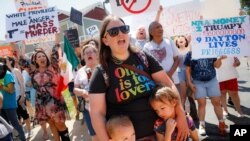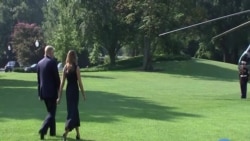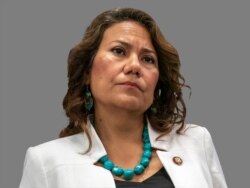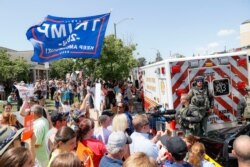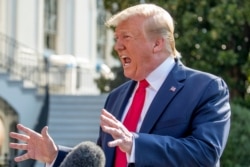Last update: Aug. 8, 7:45 a.m.
U.S. President Donald Trump, accompanied by first lady Melania Trump, visited shooting victims in hospitals in Ohio and Texas on Wednesday but stayed away from an entertainment district in Dayton and a Walmart in El Paso where gunmen killed 31 people last weekend.
Both locations attracted demonstrators who opposed Trump's visit while calling for gun control legislation. Trump supporters also showed up in both cities.
In the Texas border city of El Paso, where a gunman killed 22 people and injured two dozen more, politicians spoke at events and criticized the president.
Democratic U.S. Representative Veronica Escobar, whose district includes the site of the store shooting, said she declined an invitation to accompany Trump during his visit because of the pain his rhetoric had caused the community and the country.
Presidential candidate Beto O'Rourke said the president was not welcome there and had urged him to stay away because of his often incendiary anti-immigration rhetoric.
Hours before leaving Washington, Trump on Twitter assailed the former congressman from El Paso:
Speaking to reporters as he left the White House on Wednesday, Trump reiterated that he thought "illegal immigration is a terrible thing for this country," and he blamed criticism of his stances on immigration and guns on rivals "looking for political gain."
He flew to El Paso on Air Force One from Dayton, where he and the first lady spent about an hour at Miami Valley Hospital speaking with those recovering from a shooting in the city's nightlife district about 13 hours after the Texas tragedy.
In the Dayton attack, which lasted less than a minute, a community college student fired 41 shots that killed nine people, including his sister, and wounded another 27.
"You had God watching. I want you to know we're with you all the way," Trump told victims and family members at the hospital, according to White House press secretary Stephanie Grisham.
The spokeswoman told reporters during the flight from Ohio to Texas that the president was not engaged in any conversations about gun control at the hospital, where he also met with first responders.
High expectations on gun law reform
Before he left Washington on Wednesday morning, Trump told reporters he thought "we are going to come up with something that's going to be really, really good" on gun law reform. But he added that while he favored background checks for purchases of such weapons, there was "no political appetite" for an assault weapons ban.
U.S. Senator Sherrod Brown, a Democrat, said he and Dayton Mayor Nan Whaley asked the president during his stop in Ohio to request that Senate Majority Leader Mitch McConnell, a Kentucky Republican, bring lawmakers back to Washington from their August break this week to consider a gun purchase background checks bill already passed by the House.
Trump later criticized the two Ohio politicians for implying that he should not have visited the grieving city.
"They shouldn't be politicking today," the president told reporters in El Paso during a visit to the city's emergency operations center where he thanked first responders.
"All over the world, they're talking about the job you've done," Trump said to them.
At University Medical Center in El Paso, the president and first lady visited "with first responders, hospital staff, and victims and their families," according to the White House.
The president, speaking to reporters earlier, denied criticism that his statements contribute to the mood of hate that has unleashed repeated shootings in the United States by lone gunmen in shopping malls, fairs, concerts, entertainment districts, houses of worship and schools.
"I don't think my rhetoric does at all," the president told reporters on the South Lawn. "I think my rhetoric brings people together."
Trump noted that the Dayton gunman's social media accounts showed Connor Betts had left-wing political views, supporting Democratic presidential contenders Bernie Sanders and Elizabeth Warren, and Antifa, anti-fascist protesters.
"Nothing to do with Trump but nobody ever mentions that," he said.
The suspected gunman in El Paso, Patrick Crusius, is believed to have posted a white supremacist manifesto online hours before the shooting that expressed his intense hatred toward Hispanics, claiming they were invading Texas.
Asked whether he was concerned about a rise in white supremacy, Trump replied that he was bothered by any hate group, "whether it's white supremacy, whether it's any other kind of supremacy, whether it's Antifa, whether it's any group of hate. … I'll do something about it."
But the front-runner of the Democratic Party contest to challenge Trump in next year's election said "in both clear language and in code, this president has fanned the flames of white supremacy in this nation."
In a speech in Iowa, former Vice President Joe Biden also said Trump offers no moral leadership and has "a toxic tongue."
In Charleston, South Carolina, New Jersey Senator Cory Booker, said the El Paso attack was "sowed by those who spoke the same words" as Crusius, "warning of an invasion."
Booker, who is also seeking the Democratic presidential nomination, spoke from the pulpit of the predominantly black church that was the scene of another racially-motivated mass shooting in 2015. Nine people, including the church's pastor, were killed by a young white supremacist named Dylann Roof during a weekday church meeting.
The senator said the El Paso massacre was another episode of racial animosity and violence in America that has been "ingrained in our politics since our founding."




